Advertisement
Here's a breakdown of all the races on your jam-packed Massachusetts primary ballot
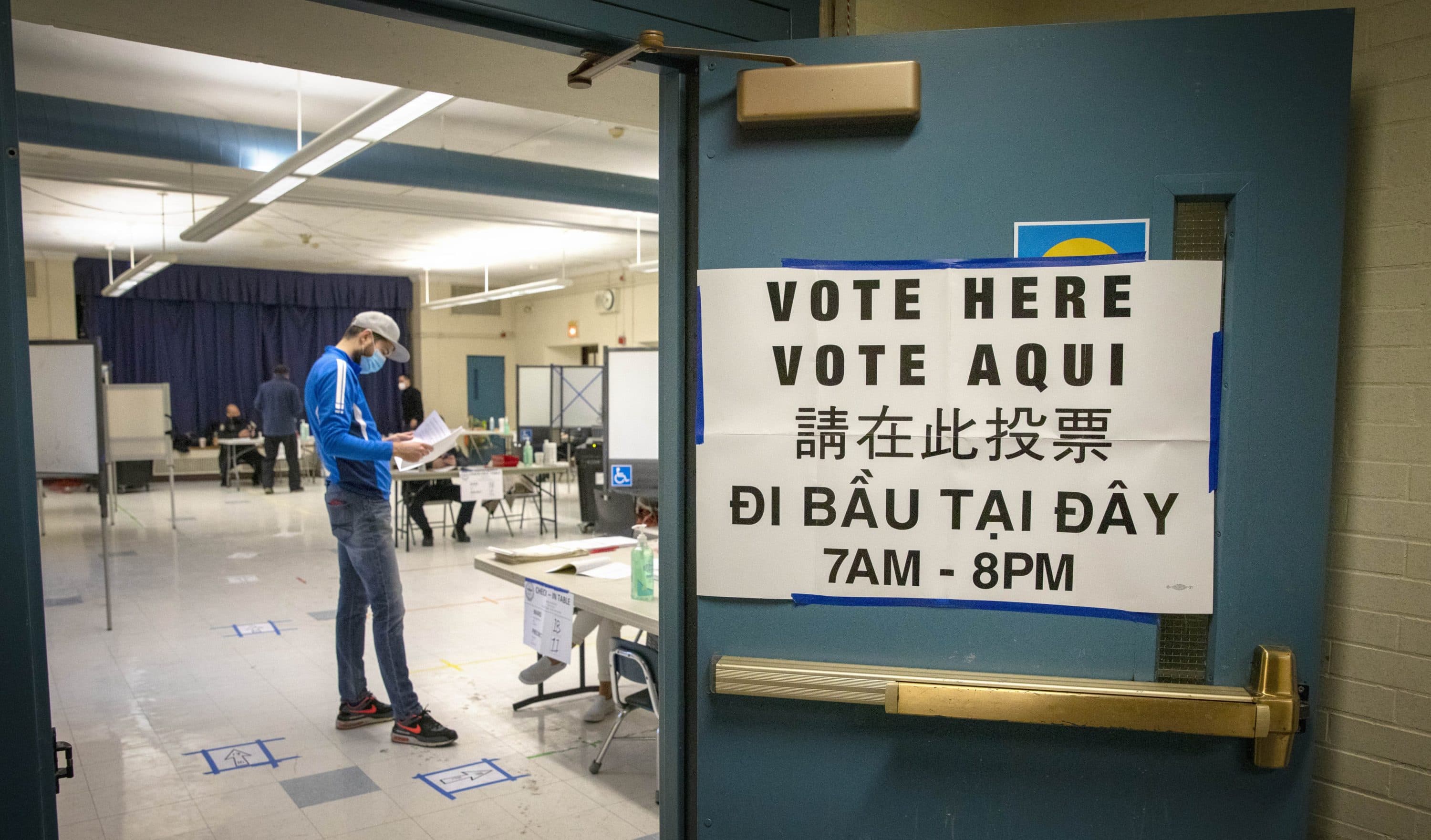
This special edition of our weekday morning newsletter WBUR Today. For more updates on the election and other news Boston is talking about, sign up here.
After months — and, in some cases, over a year — of campaigning, Massachusetts' busy 2022 state primary races are nearing their peak.
The Sept. 6 election is now less than three weeks away, and early voting begins next week. Some of you have already sent back mail-in ballots. If that’s the case, your civic duty is done and you need not read any further.
But for the rest of you — perhaps tuning back in after a well-deserved summer vacation or a little break from political coverage — here's a primer on all the competitive statewide primary races.
And there is a lot of them this year.
The decision by Gov. Charlie Baker and Lt. Gov. Karyn Polito to walk away after two terms and Attorney General Maura Healey's bid to replace the Republican governor, have left all their jobs up for grabs. We also have a fiery Democratic primary for secretary of state. There's even an animated race to replace outgoing Auditor Suzanne Bump.
Governor
The job
You're probably familiar with this one, but here are the basics: The governor of Massachusetts is the head of the state's executive branch and responsible for signing or vetoing bills, appointing or firing the heads of most major state agencies, nominating judges and granting pardons. The powers of the office can be quite broad, especially during a state of emergency, as the COVID-19 pandemic illustrated.
The candidates
— Democratic primary —
- Maura Healey, current Massachusetts attorney general
- NOTE: State Sen. Sonia Chang-Díaz will appear as a candidate on Democratic primary ballots, but halted her campaign in July.
— Republican primary —
- Geoff Diehl, former Whitman state representative
- Chris Doughty, Wrentham businessman
Candidate Backstories
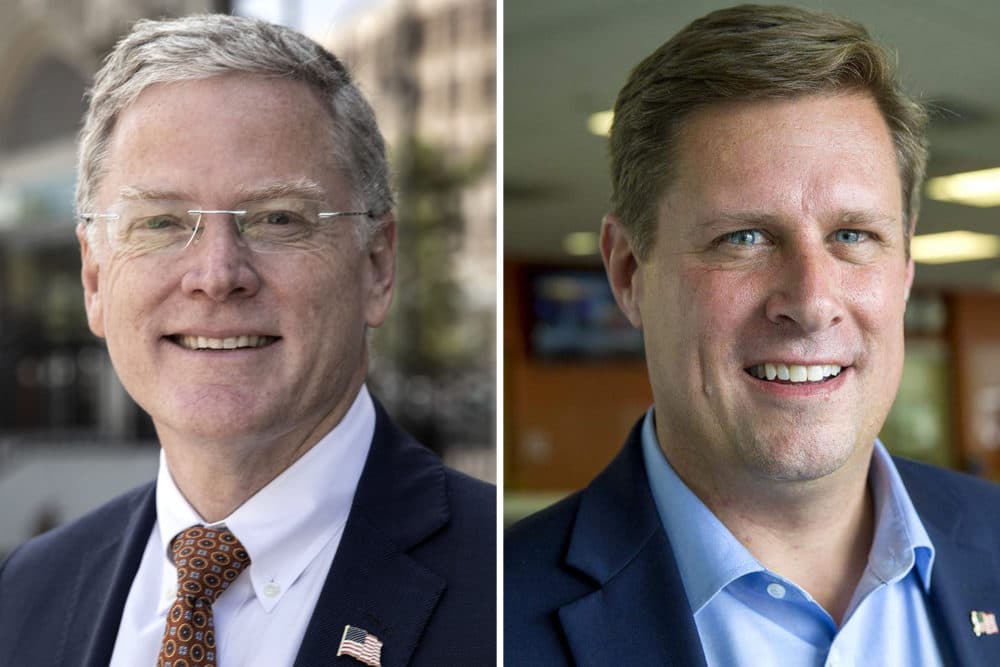
The argument
Ah yes, the good ole gubernatorial race. Shout out to the Romans for that always-fun, six-syllable word.
In this race at least, Democrats don't have a ton to vote for this summer. Healey, the race frontrunner who used much of her time in the AG's office suing the Trump administration, is effectively running unopposed in the primary, after all of her opponents dropped out one by one. And two terms filled a number of high-profile national lawsuits, the well-known Democrat is poised to enter the general election as a the heavy favorite.
So the real battle is on the Republican side.
Diehl, a well-known supporter of Donald Trump, has the former president's backing in the race and has echoed baseless claims the 2020 election was "rigged." Diehl even launched his campaign when it still seemed Baker might run for a third term and has criticized the moderate Republican governor's response to climate change and COVID, specifically mask and vaccine mandates.
Stylistically, Doughty favors Baker's more middle-ground approach, though he also holds more conservative views. He and Diehl both oppose the new state law allowing undocumented immigrants to get driver's licenses, support a broad range of tax cuts, want more parental say in public school curricula, and say they would re-hire state workers who resigned or were fired for refusing to get state-mandated vaccines.
The difference, according to Diehl's campaign, is that he has a more proven record fighting for the conservative agenda — from the State House to a 2014 ballot campaign against a gas tax increase. During a debate last month, Diehl also knocked Doughty for voting for Hillary Clinton in 2016 and "coming in out of the blue and running for governor."
"Chris has no record," Diehl spokeswoman Peggy Rose told WBUR.
Doughty's campaign counters that he has put out lengthy plans on everything from tax reform to the MBTA to the Cape. Campaign spokeswoman Holly Robichaud also noted that Doughty has pledged to continue increasing local aid to cities and towns at the same rate that state revenues grows, which Diehl has not done.
But mostly, the two Republicans have sparred over who has a better shot of defeating Healey in the general election. Doughty has touted his private sector management credentials, while arguing that Diehl's alignment with Trump would make him unelectable in a state where the former president has repeatedly lost by a landslide. But Diehl says Doughty won't capture the enthusiasm of the Republican base.
Lieutenant Governor
The job
In ordinary circumstances, the lieutenant governor doesn't have much power. Their only official responsibility is to serve on the Governor's Council. Beyond that, the daily duties are theirs to mold. Polito, for example, has worked as a liaison to local municipal officials.
But if the extraordinary happens — if the governor gets sick, dies or leaves office — the lieutenant governor steps in as acting governor. (Technically, they also take over whenever the governor simply leaves the state.)
The candidates
— Democratic primary —
- Kim Driscoll, Salem mayor
- Tami Gouveia, Acton state representative
- Eric Lesser, Longmeadow state senator
— Republican primary —
- Kate Campanale, former Leicester state representative
- Leah Cole Allen, former Danvers state representative
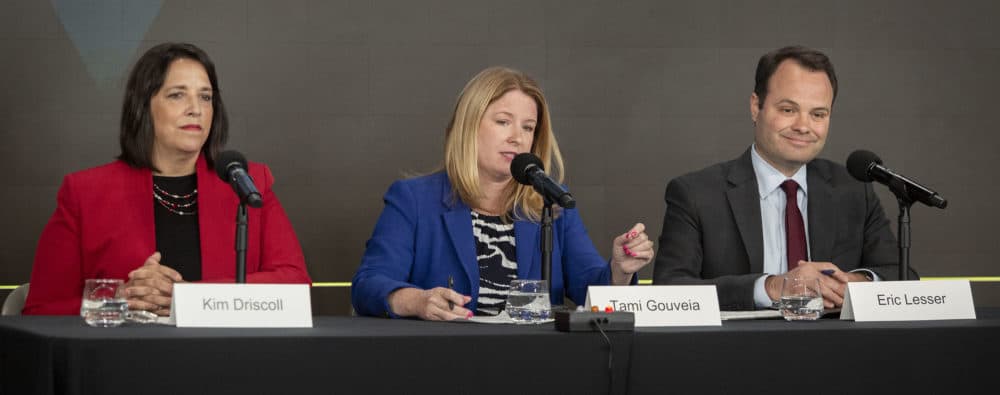
The argument
The three Democratic candidates have each honed a unique pitch for the No. 2 role.
Driscoll points to her experience in local government and says she would particularly "lean into" her work affordable housing as lieutenant governor (as mayor, she was a vocal supporter of Baker's push to change local zoning rules to build more dense housing). Driscoll also pledged to prioritize public transit and climate change.
"I'll be the strongest partner, not just to be a liaison to cities and towns, but frankly a strategic ally," she said in a recent WBUR debate.
Gouveia, who has the backing of the state's progressive groups, said she would be "a different type of lieutenant governor," using the office to convene experts focused on addressing root causes of issue like housing, climate change and mental health — and then recommend solutions to lawmakers. And as chair of the Governor's Council, she said would focus on appointing judges who understand the role that "childhood trauma, systemic racism and intergenerational poverty play in folks becoming involved in the criminal legal system."
"I want to get to work on that as lieutenant governor, drawing on my background as a doctor of public health and a social worker," she said.
Meanwhile, Lesser pitched himself as the candidate with the most experience working in federal government — and with Healey.
A former White House official with relationships in Congress, Lesser said he help secure federal infrastructure funds for local projects. He also stressed the importance of "a close relationship with the governor," plugging his work Healey on Narcan bulk purchasing and a "Student Loan Borrower Bill of Rights." (Healey has not endorsed in the race.)
Lesser also pitched himself as an advocate of the state's "underserved regions," as the only Democratic candidate from "outside I-495."
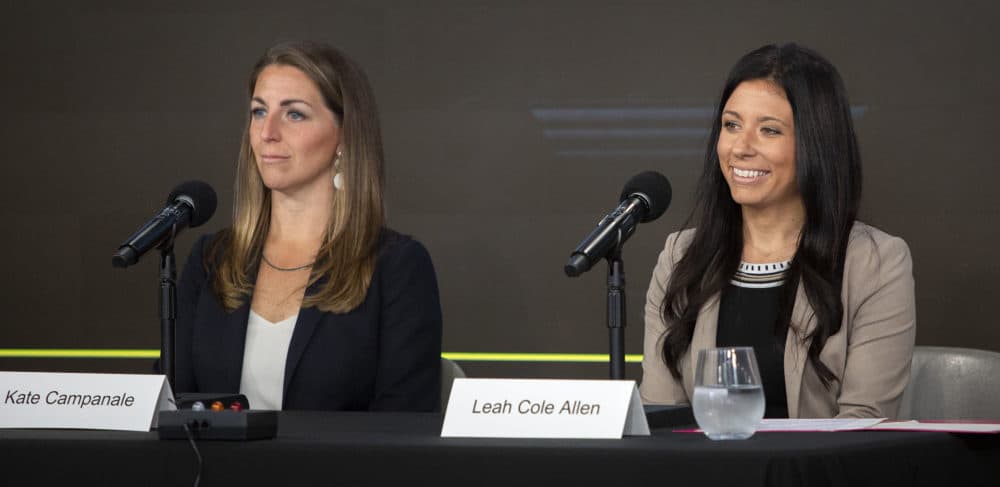
On the Republican side, Campanale is running as Doughty's unofficial running mate, while Allen has aligned with Diehl. And their race has largely echoed the themes of divide at the top of the ticket.
However, the two women have laid out differing visions for the office.
During a debate hosted by WBUR, both said they planned to continue Polito's work as the administration's point person for municipalities. Campanale, however, envisioned carving out a role helping the state's tourism industry recover from the pandemic.
"My office would take responsibility of restoring that industry here in Massachusetts," Campanale said.
Allen foresees a potentially more ideological role. As a member of the Governor's Council, she said focus on providing some "balance" to the body's eight other Democratic members and work to appoint like-minded judges and parole board members. Allen also said she would be "a liaison to parents" to make sure that they're "being heard when it comes to what their children are learning in school."
The candidates were also asked if there were any issues on which they would be passionate enough about to use temporary gubernatorial authority to act on when the governor was out of state.
Allen, who was fired from her nursing job over her refusal to get the COVID-19 vaccine, said she would "would immediately take issue with" any local or state-level vaccine "passports" as a matter of "medical freedom" and privacy. Campanale indicated that she wouldn't unilaterally act while the governor was out of state.
- Debate highlights: Democratic hopefuls in Mass. lieutenant governor primary face off
- Debate highlights: Republican candidates for Massachusetts lieutenant governor meet for debate
Attorney General
The job
The attorney general is the state's top law enforcement officer, responsible for representing the commonwealth in court, advising agencies on the law and cracking down on those who break it. That can mean bringing lawsuits against anyone from small businesses to the federal government. It also means investigating and prosecuting a wide range of criminal cases, from fraud to wage theft to corruption.
The candidates
— Democratic primary —
- Andrea Campbell, former Boston city councilor and lawyer in former Gov. Deval Patrick's administration
- Shannon Liss-Riordan, labor lawyer
- Quentin Palfrey, lawyer for the U.S. Commerce Department and former White House advisor (Update: Palfrey dropped out of the race on Aug. 30)
— Republican primary —
- Jay McMahon, Bourne lawyer
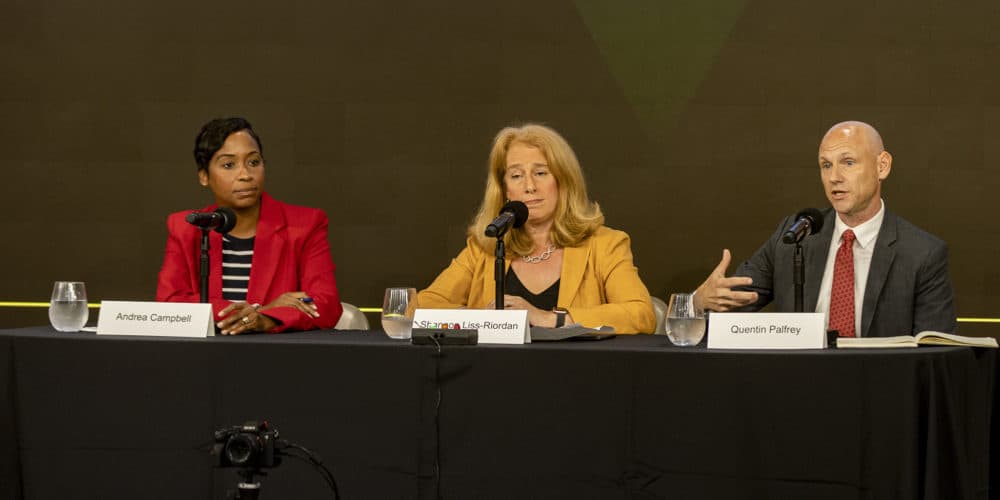
The argument
The three Democrats in the race have generally pledged to build on Healey's work to take on corporations, crack down on ghost guns, scrutinize hospital mergers and protect consumers.
The debate, however, has centered over who would be most effective.
Liss-Riordan points to her experience as a “private attorney general,” bringing class-action lawsuits against business interests. Palfrey has edged out his rivals as the most progressive candidate in the race, with his advocacy for ending qualified immunity and a pledge to "decrease prosecution" of certain nonviolent charges. And Campbell touts her lived experience growing up in a family "torn apart by incarceration and trauma." She also has Healey's support.
Much of the oxygen in the race has been taken up by arguments about fundraising and potential conflicts of interest, but there are several policy differences, too.
Palfrey and Liss-Riordan are more supportive of supervised injection sites for intravenous drug users, though Campbell says she wouldn't stand in the way of cities and towns that want to create them. Liss-Riordan and Palfrey have also said the attorney general's office should do more to address crisis pregnancy centers that critics say mislead people seeking reproductive health care. Meanwhile, Campbell wants to work with lawmakers to cap the number of guns a person can buy.
- Debate highlights: Democrats in attorney general primary race debate
Secretary of State
The job
The secretary of state is best-known for administering the state's elections, though the power to actually change election laws rests with the Legislature. The position does also have power over a laundry list of other government functions: business registration, securities regulation, public records, historic preservation and even State House tours.
The candidates
— Democratic primary —
- Bill Galvin, incumbent secretary of state
- Tanisha Sullivan, head of the NAACP's Boston chapter and lawyer for Sanofi Genzyme
— Republican primary —
- Rayla Campbell, radio host
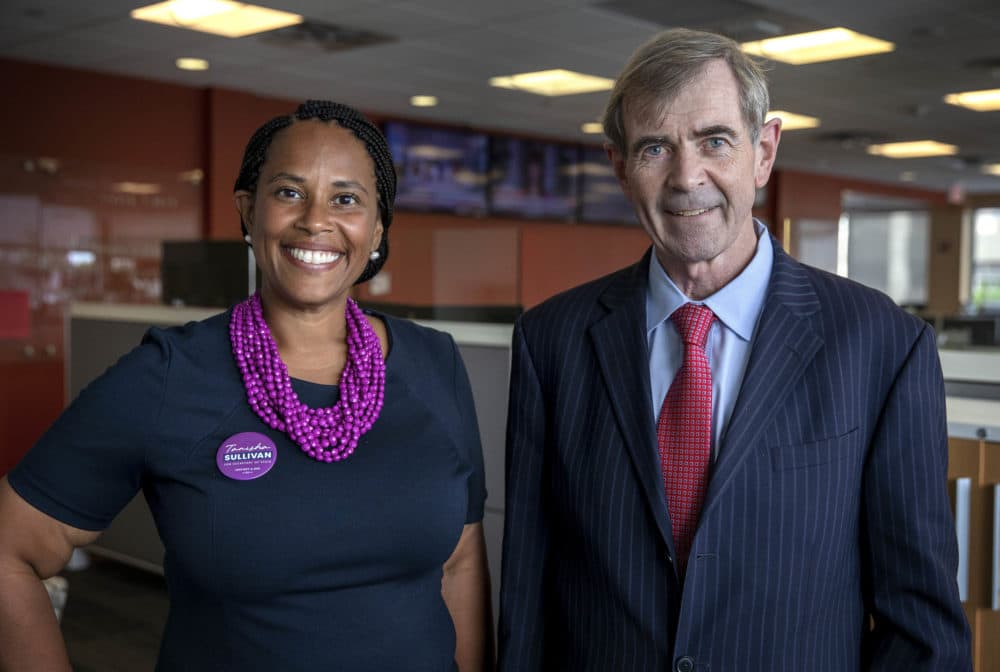
The argument
The two Democrats both support the perhaps most meaningful voting reform left on the table in Massachusetts: same-day voter registration. However, it's not within their power to implement (the state's House of Representatives has repeatedly blocked such efforts). Sullivan argues that she would push harder to get it done, while Galvin emphasizes his 25+ years of experience administering elections.
In a fiery WBUR debate, Galvin went so far as to accuse Sullivan of not understanding the job, after she repeatedly accused him of not advancing voting rights urgently enough, particularly citing a 2014 lawsuit over the implementation of a federal law.
The race, however, isn't just about elections.
Sullivan has also seized on Galvin's decades-old anti-abortion votes and called for the secretary of state's office to be more "pro-active" in the abortion fight.
She has proposed expanding the office's power to shield reproductive health providers' information in public records and require companies to disclose whether their plans cover abortion services. Galvin says he believes abortion is a woman's choice and that pro-choice advocates have trusted him to enforce the state's recently expanded laws.
- Debate highlights: Democrats vying for secretary of state gather for debate
Auditor
The job:
The state auditor acts as a watchdog of other state government agencies. They don't really have any enforcement powers, but they can conduct investigations into agencies and departments to shine a light on questionable spending and mismanagement.
The candidates:
— Democratic primary —
- Chris Dempsey, transportation activist, co-founder of No Boston Olympics and former assistant state transportation secretary
- Diana DiZoglio, Methuen state senator
— Republican primary —
- Anthony Amore, security director at the Isabella Stewart Gardner Museum
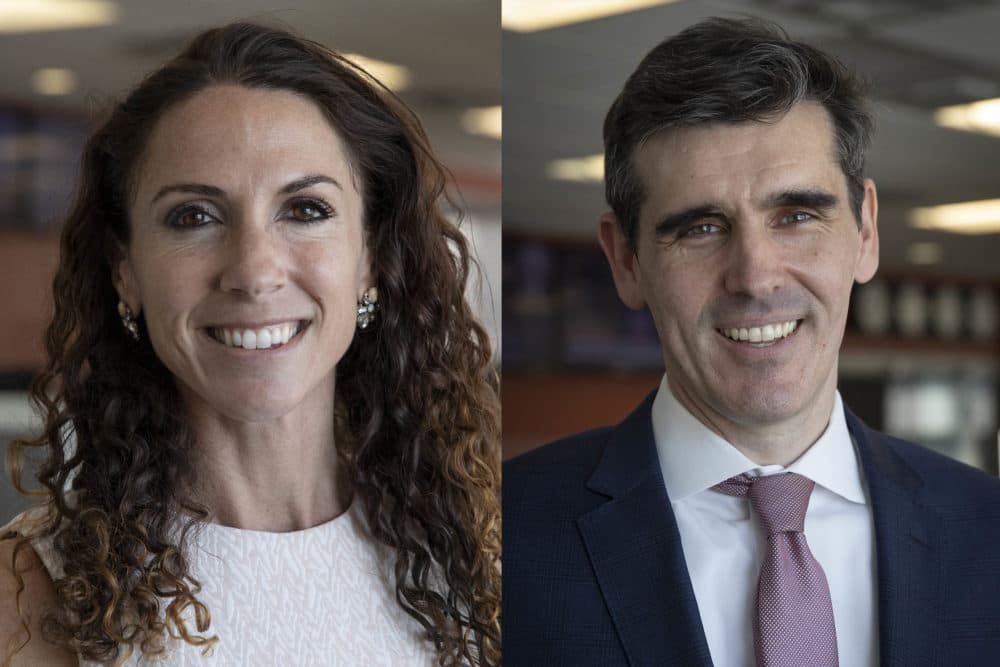
The argument
The two Democratic candidates are both pledging to supercharge the under-the-radar office — albeit with slightly different focuses and experiences.
Dempsey, who has the backing of most local progressive groups and elected Democrats, points to his experience taking on the well-heeled backers of Boston's bid for the 2024 Olympics, as well as his time at MassDOT creating an open data program. Meanwhile, DiZoglio has made her name standing up to Beacon Hill bosses and claims the support of several major statewide unions.
DiZoglio has pledged to audit the Legislature — particularly what she calls the "abuse" of taxpayer-funded non-disclosure agreements. That's something the current auditor, Bump, says the office doesn't have that legal authority to do. (Bump has also endorsed Dempsey.)
As auditor, DiZoglio says she would use the office to expose the use of NDAs across state agencies as well, as part of a broader social justice plan. The plan also puts an emphasis on checking whether the state's contracting practices are meeting its diversity goals.
For his part, Dempsey has primarily campaigned on a plan to check whether state agencies are meeting their greenhouse gas emission reduction goals. He's also pledged to audit the scandal-plagued State Police, while knocking DiZoglio for several votes against police reform proposals in the Senate.
In the wake of recent incidents on the MBTA, DiZoglio has also vowed to conduct a safety audit on the MBTA, something Dempsey argues the office doesn't have the expertise to do. He is instead proposing an audit to see whether the T is following through on recommendations made by the federal regulators.
- Debate highlights: Democrats running for Massachusetts auditor gather for debate
